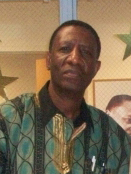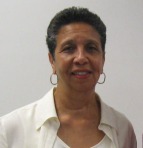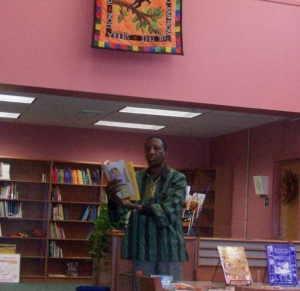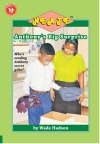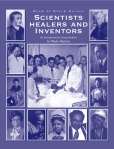Our Author Visit to Martin Luther King, Jr. Charter School
New Orleans, LA
Wednesday, November 10, 2010
In association with PEN Children’s & Young Adult Book Committee
We began preparing for our visit to Martin Luther King Jr. Charter School months before actually reaching New Orleans. We knew that we’d be doing double duty as both authors and as publishers and we were pretty much prepared for that. But there was added excitement surrounding this particular visit because in a sense, Wade would be returning home.
A native of Louisiana, Wade had attended Southern University in Baton Rouge during the 1960s and was familiar with the area and the culture of New Orleans. Other PEN members had visited MLK in the past two years, but Wade would be the first black male author to visit MLK and would perhaps relate to the students in a more personal way because of their common backgrounds.
Although we had visited Louisiana a number of times for teacher and library conventions and to visit family, we had not returned to New Orleans since the tragedy of Hurricane Katrina.
Would we recognize the city? Would we feel comfortable staying in tourist digs near the French Quarter and then traveling to the still devastated Ninth ward the next morning to visit the only school in that entire area of the city that was open and functioning? How would the staff and students receive us?
Any doubts or fears dissolved when we were greeted and received literally with open arms by the staff and by the students. We went to New Orleans as representatives of Just Us Books—prepared to “Share Our Story” but we both came back energized, renewed in spirit and with many more stories to share.
WADE’S STORY
I was born and raised in Louisiana and attended Southern University in Baton Rouge. So I was anxious to visit my home state, and the city of New Orleans and speak to students at the Martin Luther King Charter School. Although I had visited New Orleans several times since I moved from Louisiana, I had not been there since Hurricane Katrina hit in 2005.
Mrs. Karen Ott, a member of the MLK School staff, picked up my wife Cheryl and me from our hotel to take us to the school. On the drive to Caffin Avenue, she showed us some of the areas of the city that
had been damaged by Hurricane Katrina. Some of these areas had rebounded in a strong way from the devastation and destruction. That was especially true of the French Quarter.
But in many other areas, it seemed that much still needed to be done, especially in the Lower Ninth Ward where the MLK Charter School is located. Yes, there was some home construction taking place, but it appeared to me that the

Some new housing in the Lower Ninth Ward, sponsored by actor Brad Pitt and his not for profit organization.
Lower Ninth Ward was quite a ways away from being a bustling, viable community—alive and vibrant. My spirit was a little low as we continued to ride around the area and saw so many boarded-up churches, schools and other buildings.
This post by Tracie Gallagher, which appeared on Fox News.Com on August 23, 2010, really says it all.
“Five years after Katrina many parts of the lower 9th ward look like the flood waters just receded yesterday.
Many of the damaged and destroyed homes have not been touched at all, in fact many still have those infamous red Xs painted on the front, indicating the date the homes were inspected and how many bodies were found inside.
Clearly the recovery and rebuilding process is moving at a snail’s pace.
Before Katrina there were 5300 homes in the lower 9th ward. Every single one of them was flooded and uninhabitable. Now only 1200 have been repaired or rebuilt.
The main reasons more people haven’t come back to the 9th ward is because there are only three volunteer organizations building homes, and they don’t have enough money or resources to build faster.
And the infrastructure in the lower 9th is still almost nonexistent. No fire department, no hospitals, no grocery stores, and only one elementary school, the other students are bussed miles away.
But the people who have returned are proud and passionate. And when the 9th ward rises again, (and it will indeed rise) it will be those who came back first who inspired those who came back eventually.
When we arrived at the MLK School, however, I perked up. As I looked at the structure, it stood as a beacon of hope for the Lower Ninth Ward, a clear example of how the communities of the Ninth Ward and New Orleans can come back even stronger.
Mrs. Ott escorted Cheryl and me into the building where we were treated to coffee and doughnuts and were serenaded by a recording of the school’s song. Soon Mrs. Doris Hicks, the school’s dynamic principal, came to greet us. We were already aware of the tremendous role she has played in bringing MLK School back following the hurricane and flood, and how she has overcome so many obstacles and challenges in her mission to make MLK a stellar academic institution.
After our chat with Ms. Hicks, Mrs. Ott escorted Cheryl to a first grade classroom, and then led me to the school library where I was to make my presentations to two fifth grade classes. The library serves a dual role. It is a part of the New Orleans Public Library System and is open to the community, and it is used by the MLK School.
My first group of fifth graders had read Anthony’s Big Surprise, the third book in the NEATE series I created for Just Us Books. The second group had read Book of Black Heroes: Scientists, Healers and Inventors, a title in the Book of Black Heroes series I developed for Just Us Books.
As the students assembled in the large library reading room one asked a question I could not quite hear. I was told that he wanted to know “where my wife was.” I was also told that the student was relating us to President Barack Obama and his wife, first lady Michele Obama. The President had paid a visit to MLK during the 2009 school year. The question made me realize further how important role models are. Because of our visibility as writers and publishers, many people see my wife Cheryl and me as role models. Over the years, we have readily accepted and embraced this position. But being mentioned in the same sentence as the first African-American President, his intelligent, beautiful and charming wife and family brought a smile. I understood the association, but the responsibilities and challenges Cheryl and I face are quite minor compared to those faced by the first family.
The students sat attentively as I shared with them my story. I was born in a small town nestled in the northwestern section of the state, south of Shreveport. Mansfield was and still is a small rural town. I grew up during a time when most cities and towns in Louisiana and in the South were segregated and Jim Crow Laws still governed life for blacks and whites. (Ironically, even today, many communities and schools in New Orleans and around the state of Louisiana are still segregated.) The Civil Rights struggle had begun to make a big difference, but major changes still needed to be achieved in the fight for racial equality and justice.
I shared how our all-black schools received books that had been previously used and discarded by the students at white schools in my hometown. These books had virtually nothing in them about African-American history, culture and experiences. Our school library was void of books that included stories about black people or books written by black writers. So for me, and many of my peers, great writers such as Langston Hughes, Richard Wright, Ralph Ellison, Zora Neale Hurston and Gwendolyn Brooks didn’t exist. As a youngster growing up, I told them, I enjoyed writing and often wrote poems and short stories. I never considered writing as a career. I knew it was a gift that I had been given, but, at that time, I didn’t see writing as a vehicle for me to make my contributions to the world.
Wouldn’t it have been wonderful if I had had the opportunity to read the works of great black writers such as Hughes, Ellison and Hurston? They would have been ideal role models for a little black boy discovering the gift with which he had been blessed. It wasn’t until I entered Southern University in Baton Rouge that I learned about black writers who had made significant contributions to the worlds of literature and history. It was then, that I realized I too could have a career as a writer.
I told the students that I have written nearly 30 books for children and young adults. That I also penned plays that have been produced professionally, worked as a newspaper reporter and in public relations where I have used my writing skills. Many of the books I have authored were on display in the library for the students to see. Then I shared how, in 1988, my wife Cheryl and I started our own children’s book publishing company, Just Us Books, Inc. to produce children’s and young adult books that spotlight, highlight, explore black culture, black history and black life experiences.
I told the students how important it is that they learn about the history and culture of their ancestors. That it is important that their experiences be shared to help educate as well as entertain others and make others aware that we have a world shared by many different races, ethnic and religious groups. That it is crucial for any child or young adult to see characters that look like him or her in books, on television and in movies and in all others modes of communication.
Near the end of my presentation to the first group of students, I read from Anthony’s Big Surprise from the NEATE series. The series features five African-American eighth grade students who live in the same community and attend the same junior high school. Determined to support and encourage each other, they use the first letter of each of their first names to name their group – N for Naimah, E for Elizabeth, A for Anthony, T for Tayesha and E for Eddie. Anthony’s Big Surprise focuses on 13-yeaar-old Anthony, who is being raised by a single mother. Anthony’s mother has told him that his father was killed when Anthony was very young. When the story opens, Anthony is receiving expensive anonymous gifts. He eventually finds out that the gifts are from his father, who, in fact, is not dead. I read from the scene where Anthony finds out that his father isn’t dead, the heart-wrenching and challenging moment where he first meets his father in the principal’s office.
“Anthony was getting confused. The name was right. The instrument was right. Could this man really be his father? If so, that would mean his father wasn’t dead. But wait, a family friend could know that much. In fact, anybody could know as much as this stranger knew. But why would anyone who wasn’t Anthony’s father want to go through all this?”
Following the reading I engaged the students in a lively discussion. I asked questions such as, “If you were Anthony what would you do?” “Would you accept a father who has never been a part of your life?” Most of the students had strong opinions. Many of them were being raised by single mothers and could relate to Anthony’s situation. Most of the students said they wouldn’t accept a father who has not been there for them. The father, they felt, should earn an acceptance.

MLK 5th graders listen to author Wade Hudson's presentation in the library.
For my second presentation of the day, I read from Book of Black Heroes: Scientists, Healers and Inventors. The book was written to introduce young readers to some of the many African Americans who have made important contributions to science, medicine and invention. I thought this would be particularly appropriate given the MLK Charter School’s focus on science and technology.
I really enjoyed my visit to the MLK Charter School. The students were well-mannered, inquisitive and bright. They asked provocative and well conceived questions. A generation ago, I was in their shoes, eager and anxious to learn as much as I could, looking forward to a brighter future beyond situations that would paint a bleak picture of what lay ahead for me. I felt a real connection to these students. As I signed copies of my books each of them held, I had an opportunity to chat with some of them and to look into their faces and share smiles with them. As I left the library following my last presentation, I felt assured, in the hands of these students, the city of New Orleans would be just fine.
Next blog: CHERYL’S STORY



